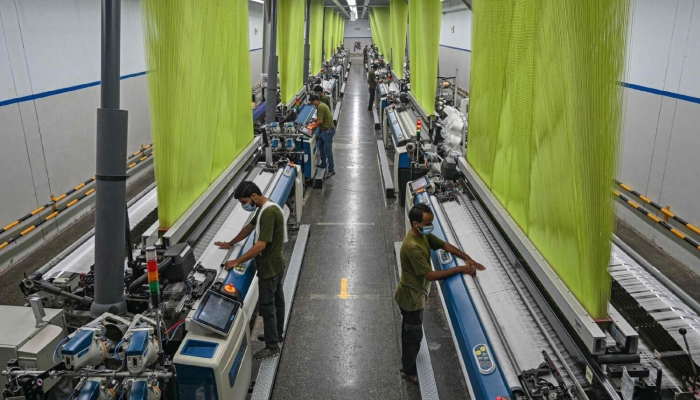Pakistan eyes silk industry to cut imports, boost jobs
Apart from wide presence in Punjab, they can also be found in KPK, Abottabad, and GB
LAHORE: Pakistan could save a major portion of its annual Rs67 billion silk import bill and create jobs for hundreds of thousands of rural women by producing the fabric locally, experts said on Thursday.
Pakistan is one of the world’s largest importers of silk, mainly from China, for its textile industry, which accounts for about 60 percent of its exports. But the country has the potential to produce its own silk by tapping into its abundant mulberry trees, which are the main source of food for silkworms.
Mulberry trees are widely grown in rural areas of Pakistan, especially in Punjab province, where they are used for making baskets, jams, and teas. They can also provide silk for the textile sector if their leaves are fed to silkworms, which spin cocoons that can be harvested and processed into silk threads.
Apart from wide presence in Punjab, they can also be found in KPK, Abottabad, and GB. Thanks to the hot climate, the growth period of mulberry trees in Pakistan is about 10 months, which means its leaves can be harvested several times within one year.
“Mulberry is a fruit tree with no part going waste,” said Moazzam Ghurki, president of the Pakistan China Joint Chamber of Commerce and Industry (PCJCCI), at a think tank session held at the PCJCCI secretariat in Lahore.
Its leaves can be used as feed for silkworms, which provide silk for the textile sector; its branches are used to make different types of baskets that can be seen in almost every rural house of Pakistan. Its fruit is edible and can be processed into mulberry juice, powder, jam, vinegar, and tea."
Fang Yulong, senior vice president of PCJCCI, said that China, the world’s largest producer and consumer of silk, could provide technical assistance to Pakistan in developing its silk industry. "Most of our techniques can also be applied in Pakistan as long as local climate fits," Yulong said.
He said several improved mulberry varieties selected and bred by the research institute has proved to increase mulberry leaf output by around 30 percent. Up to now, two new series, namely, Nongsang and Qiangsang, have covered over 70 percent of China’s grafted mulberry fields. They were also provided to farmers, contributing to the country’s fight against poverty.
Yulong said that mulberry saplings have been exported to Uzbekistan. "By providing technical support such as breed selection and planting guidance to the Chinese companies cooperating with Uzbek government, this can also be applied in Pakistan as long as water resources suffice. For areas with inadequate water, we can grow seedlings in China when they are vulnerable and then graft them to Pakistan."
-
 'Prince Harry Sees A Lot Of Himself In Brooklyn Beckham'
'Prince Harry Sees A Lot Of Himself In Brooklyn Beckham' -
 Kate Middleton’s Cancer Journey Strengthens Her Commitment To Helping Children
Kate Middleton’s Cancer Journey Strengthens Her Commitment To Helping Children -
 Gaten Matarazzo Compares 'Stranger Things' Ending To 'Lord Of The Rings'
Gaten Matarazzo Compares 'Stranger Things' Ending To 'Lord Of The Rings' -
 Prince Harry Slams Publisher Over 'dirty Trick' Ahead Of Showing Evidence
Prince Harry Slams Publisher Over 'dirty Trick' Ahead Of Showing Evidence -
 Blueface Promises To Change Behaviour If His Ex Comes Back
Blueface Promises To Change Behaviour If His Ex Comes Back -
 Prince Harry Makes Crucial Promise To Meghan Markle Over UK Return
Prince Harry Makes Crucial Promise To Meghan Markle Over UK Return -
 Keir Starmer’s China Visit: UK Follows Mark Carney In Major Reset Of Ties
Keir Starmer’s China Visit: UK Follows Mark Carney In Major Reset Of Ties -
 NASA Celebrates One Year Of Trump’s Second Term With Moon And Mars Achievements
NASA Celebrates One Year Of Trump’s Second Term With Moon And Mars Achievements -
 Chris Pratt Shares Real Thoughts On AI In Film Industry
Chris Pratt Shares Real Thoughts On AI In Film Industry -
 Netflix Disappointed As Meghan Markle’s Series Struggles To Impress
Netflix Disappointed As Meghan Markle’s Series Struggles To Impress -
 Royal Family Announces Death Of Princess: King Releases Statement
Royal Family Announces Death Of Princess: King Releases Statement -
 Sarah Ferguson Will Continue To Be Part Of Andrew's Life
Sarah Ferguson Will Continue To Be Part Of Andrew's Life -
 Google’s Gemini Now Offers Free SAT Prep With Full-length Mock Tests
Google’s Gemini Now Offers Free SAT Prep With Full-length Mock Tests -
 Everything You Need To Know About Macron’s Viral Glasses: Cost, Model, All Details Revealed
Everything You Need To Know About Macron’s Viral Glasses: Cost, Model, All Details Revealed -
 Elon Musk Warns Of AI ‘supersonic Tsunami’: What It Means For Future
Elon Musk Warns Of AI ‘supersonic Tsunami’: What It Means For Future -
 Why Victoria Beckham's Dance Video From Brooklyn's Wedding Won't Be Released
Why Victoria Beckham's Dance Video From Brooklyn's Wedding Won't Be Released




